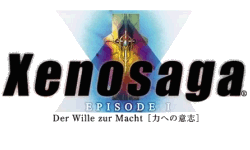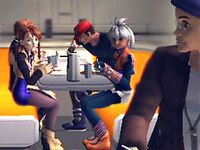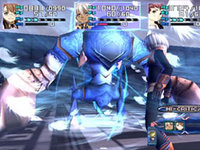|
|

|
PLATFORM
|
PS2
|
BATTLE SYSTEM
|

|
INTERACTION
|

|
ORIGINALITY
|

|
STORY
|

|
MUSIC & SOUND
|

|
VISUALS
|

|
CHALLENGE
|
Unbalanced
|
COMPLETION TIME
|
40-60 Hours
|
|
OVERALL

|
+ Interesting and compelling narrative tangents
+ Enormous freedom in character development
- Infuriatingly obtuse turn order
- Glacial pacing
- Musical score is absent most of the time
|
Click here for scoring definitions
|
|
|
It's really a shame that the mixed reaction to the Xenosaga series seems to have removed any impetus from former Squaresoft developers to revive older properties that have been shelved, because the potential is high for new titles outside the suffocating Square-Enix umbrella of today. Then again, the Xenosaga series reputedly took awhile to get its procedure just right, and the first game certainly did not attract the greatest possible audience. Xenosaga Episode 1: Der Wille zur Macht is often interesting and hardly a cookie-cutter RPG, but that does not mean everything it tried to do was successful.
The story begins roughly 4000 years in the future, as gifted scientist Shion Uzuki puts her combat android KOS-MOS through some preparatory simulations. KOS-MOS is necessary to fight mysterious beings called the Gnosis that are not completely on the same dimensional plane with humanity, but are nevertheless eager to dissolve any people they come across. These aliens do not take the central antagonist role of the plot, however, as humankind is quite capable of producing unpleasant personalities to scheme for power four millenia from now. Shion will meet several of them, and a number of much more agreeable companions, as her effort to simply do her job keeps getting sidetracked.
Xenosaga's story is communicated through now-infamous cutscenes of great length, though often these plot developments consist of static scenes in which characters utter reams of dialogue to each other. The core tenets of the plot are not original in the world of science fiction, with unmistakable references to Blade Runner and Star Wars just for a start, but the tale is engrossing enough to make this inconsequential. The relatively few action scenes that occur feature leaps of logic that will be off-putting to anyone with a passing knowledge of how outer space works, but the result is no worse than many brain-dead Hollywood feature films. The episodic approach Monolith Soft adopted with this series means that many tangents and characters are given insufficient development, but that should only be a problem to those seeking a self-contained title.
 "So I spiked your coffee with a shot of rum - so what? You looked like the kind of girl who can hold her liquor."
"So I spiked your coffee with a shot of rum - so what? You looked like the kind of girl who can hold her liquor."
|
|
During the interactive portions of the adventure, Xenosaga's combat consists of turn-based encounters against visible adversaries. The encounters use a few interesting ideas, such as two different attack types and a need to incorporate defensive postures in order to use characters' most powerful attacks. Some characters also possess the ability to hop into powerful mechanical exoskeletons at will, though with the proviso that they can no longer use items or spells. What fouls the battle system is its incredibly unpredictable turn order. Enemies will often get more turns than the protagonists, and they will use them to inflict quite a bit of pain. There is a theoretical system behind the turn progression, but something akin to Final Fantasy X's handy display of the actions to be taken would have removed the mystery. Instead, players will scream at the screen when enemies magically move faster than seems possible.
Xenosaga features quite an extensive means of developing its characters, with characters pooling three different types of points that can then be applied towards numerous skill and statistic upgrades. Several nifty options are available, but the most useful is the ability to give other characters spells that they would not normally learn. Among other highly beneficial stratagems, this enables every character to learn a group healing spell. While this character development would have been a lot more efficient if it didn't require navigating through four separate areas within the menu, the results are worth it.
Doing all of this takes time, of course. Everything in Xenosaga Episode 1 takes time, often a lot more than would be ideal. Moving through the environments is slowly done even while running, the cutscenes often settle for glacially paced dialogue delivery instead of snappy action, extra button presses and steps bog down use of the menus, the basic animations of battle take a little while, and the load times that accompany everything else become more noticeable as they add extra seconds spent waiting. The result is not the intolerable mess it could have been, and anyone seeking constant action already knew to steer clear of this game, but large quantities of patience are nevertheless required to play this title.
 Certain Gnosis just happen to look like biped arthropods. No one knows why.
Certain Gnosis just happen to look like biped arthropods. No one knows why.
|
|
Xenosaga's visuals are consistently solid without ever pushing the PS2's capabilities. Each location is distinct and the enemies use a minimum of palette-swapping, but at the cost of seeing most things enough to make them overly familiar. These visuals are not the pinnacle of PS2 prowess, but certainly get the job done with few eyesores.
Yasunori Mitsuda's score is rather good, but judging it by what is played during the game proves quite difficult. Some of the cutscenes feature music, but outside of a single battle theme, the sounds heard while navigating the environments are limited to footsteps and other sound effects. There are a couple of exceptions to this, but 90% of the game outside battle has no music. Its cutscenes contain a large quantity of voice acting, which has a few low points but is never execrable, and most of the performances are quite good.
The unpredictable turn order is what makes Xenosaga's difficulty hard to categorize: if a boss manages to use its incredibly powerful attack before someone can heal the party, death is the result. Additionally, the regular enemies are often powerful enough to cause concern, especially when some of the later foes have instant death abilities. Despite its linearity, Xenosaga does have some optional content, but not enough to push its completion time past a little over forty hours.
Oddly, Episode 1 is at its best during the massive cutscenes for which it is best known. Their direction may be lacking, but the narrative is free of any major issues — except borrowing from Hollywood's logic-challenged action sequences. When it comes to actually playing the game, a lot of little things and a couple of big ones add up to frustration. The infuriating aspects are tempered by what Xenosaga manages to do right, but not enough to make me recommend it for anyone but big science fiction buffs.
Review Archives
|









